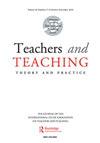不确定性现象作为体育教育领域的机遇、挑战和特征:系统回顾
IF 1.9
2区 教育学
Q2 EDUCATION & EDUCATIONAL RESEARCH
引用次数: 0
摘要
摘要由于学校作为教育机构的任务是赋予今天的学生(作为未来的公民)以负责任的方式过他们的生活,当前的社会变化(如数字化)表明,不确定性可能是教育活动的一个特别重要的方面。在这篇论文中,系统地回顾了43篇关于体育教育(PE)领域不确定性的文献。因此,我们可以确定不确定性现象的三个维度:(1)不确定性是促进体育课堂学生深度学习过程(培养)的机会;(2)不确定性是体育教师和职前教师面临的挑战;(3)不确定性是运动、游戏和运动的特征。本文讨论了这些发现对体育教学和教师教育的影响。在区分一个学科领域(这里是PE)不确定性现象的这三个维度时,文章提出了一种分析其他学科不确定性的结构,以及更广泛的研究领域,如专业主义或学校发展的研究。关键词:不确定性、偶然性、模糊性、体育教师、教育教学披露声明作者未报告潜在的利益冲突。非常感谢Judith Keinath(汉堡大学)的翻译。在德语中,教育被理解为教师以影响学生实现其教育目标为目的的行动。相反,建设被理解为一个人处理世界的个人过程。这个过程不能由教师“制造”:他们只能提供自我建设的机会(Koller, Citation2011)。在4.1.3中,建筑的理论方面正在深化。德国教育部长会议。体育教育一词被理解为在教育背景下的体育教学的统称,无论是在学校还是在儿童和青少年运动中。在这种情况下,我们对体育运动的理解更广泛,包括各种各样的运动和游戏。在下文中,这种合作是用简短的参考“FFSU内部的合作”来表示的。欲了解更多信息,请访问https://www.ew.uni-hamburg.de/forschung/fakultaere-forschungsschwerpunkte/ungewissheit.html6。确定维度的程序是与FFSU合作制定的,主要包括pe的视角。赛伯斯用德语和英语出版了类似主题的作品。ole Stabick自2020年以来一直是汉堡大学的博士生。Ole的研究重点包括不确定性作为教学行动的一个维度,体育教育中的(认知)激活和体育运动中的包容。Ingrid BährIngrid Bähr自2010年以来一直是汉堡大学教育科学教授(专注于体育教育)。Ingrid的研究重点是开放体育课堂的学与教的过程和结果;不确定性作为教学行动的一个维度体育运动中的社会学习;体育和运动的性别方面;以及儿童早期的体育教育。本文章由计算机程序翻译,如有差异,请以英文原文为准。
The phenomenon of uncertainty as an opportunity, challenge and characteristic in the field of physical education: a systematic review
ABSTRACTBecause schools as educational institutions have the task of empowering today’s students (as future citizens) to lead their lives responsibly, current social changes (such as digitalisation) suggest that uncertainty may be a particularly important dimension of educational activities. In this manuscript, a systematic review of 43 references dealing with the topic of uncertainty in the field of physical education (PE) is presented. As a result, one can identify three dimensions of the phenomenon of uncertainty: (1) uncertainty as an opportunity to foster processes of deep learning (Bildung) among students in the PE classroom, (2) uncertainty as a challenge for PE teachers and preservice teachers and (3) uncertainty as a characteristic of movement, games and sports. The paper discusses the consequences of these findings for teaching and teacher education in PE. In distinguishing these three dimensions of the phenomenon of uncertainty in the field of one subject (here PE), the article suggests a structure for analysing uncertainty in other subjects, as well as with respect to wider fields of research such as research on professionalism or school development.KEYWORDS: Uncertaintycontingencyambiguityphysical educationteacher educationteaching Disclosure statementNo potential conflict of interest was reported by the author(s).Notes1. Many thanks to Judith Keinath (University of Hamburg) for the translation.2. In the German language, education is understood as teachers’ action with the aim of influencing students in terms of their educational goals. In contrast, bildung is understood as an individual process of a person dealing with the world. This process cannot be ‘made’ by teachers: they can only provide opportunities for self-bildung (Koller, Citation2011). The theoretical aspect of bildung are being deepened in 4.1.3. German Conference of Ministers of Education.4. The term physical education is understood as a collective term for sports instruction in an educational context, be it at school or in children’s and youth sports. In this context, we comprehend sport in a broader sense, including all different kinds of movement and games.5. In the following, this collaboration is indicated using the short reference ‘Cooperation within FFSU’. For more information, see https://www.ew.uni-hamburg.de/forschung/fakultaere-forschungsschwerpunkte/ungewissheit.html6. The procedure to identify the dimensions was created in cooperation with FFSU, intensively including the perspective of PE.7. Seiberth published works on a similar topic in both the German and English languages.Additional informationNotes on contributorsOle StabickOle Stabick has been a PhD student at the University of Hamburg since 2020. Ole’s research foci include uncertainty as a dimension of pedagogical action, (cognitive) activation in physical education and inclusion in sports.Ingrid BährIngrid Bähr has been a Professor for Educational Science (focussing on physical education) at the University of Hamburg since 2010. Ingrid’s research foci are the processes and results of learning and teaching in open physical education classrooms; uncertainty as a dimension of pedagogical action; social learning in physical education and sports; gender aspects of physical education and sports; and physical education in early childhood.
求助全文
通过发布文献求助,成功后即可免费获取论文全文。
去求助
来源期刊

Teachers and Teaching
EDUCATION & EDUCATIONAL RESEARCH-
CiteScore
4.20
自引率
7.40%
发文量
71
期刊介绍:
Teachers and Teaching: theory and practice provides an international focal point for the publication of research on teachers and teaching, in particular on teacher thinking. It offers a means of communication and dissemination of completed research and research in progress, whilst also providing a forum for debate between researchers. This unique journal draws together qualitative and quantitative research from different countries and cultures which focus on the social, political and historical contexts of teaching as work. It includes theoretical reflections on the connections between theory and practice in teachers" work and other research of professional interest.
 求助内容:
求助内容: 应助结果提醒方式:
应助结果提醒方式:


